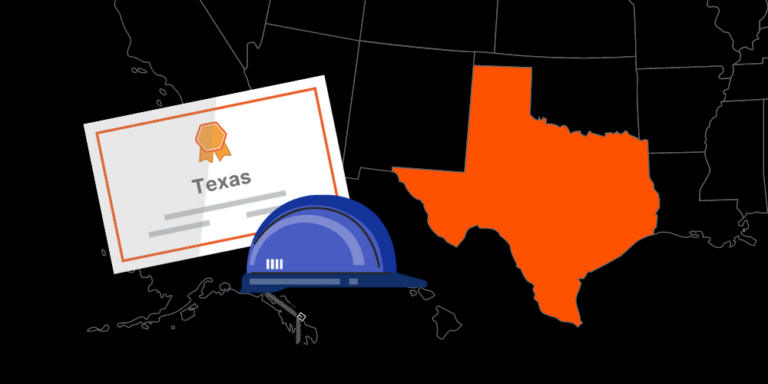— 9 min read
Texas Contractor Licensing Rules & Requirements
Last Updated Jun 19, 2024
Last Updated Jun 19, 2024

If you’re considering becoming a contractor in the state of Texas, you’re probably trying to discern which rules and regulations are applicable to your line of work. There can be specific insurance, bonds, and other requirements — including carrying a license.
If you are starting a new construction business or looking to expand your business into Texas, this guide will point you in the right direction toward running your business above board. We’ll go over the application process, the rules, and the requirements for getting a license. The goal is to ensure you’re able to build your business without the stress of wondering if you’re in compliance with local laws and regulations.
For information on licensing in other states, check out The Ultimate Guide to Contractors License Requirements in Every State.
Table of contents
Do you need a contractor license in Texas?
Not all contractors in Texas need to hold a license. Whether or not you need a license depends on your trade and the area in which you’re working. So who needs a contractor license in Texas?
Builders, handymen, and home improvement specialists
If you’re a handyman, general contractor, or builder, you don't need a contractor license in Texas. The state does not require folks in these lines of work to carry a license issued by the State. However, you might have some additional paperwork to sort through depending on where you’re working — and certain Texas cities require specific licenses and registration to work in depending on your trade and other factors.
Plumbers, electricians, and HVAC contractors
Contractors that specialize in certain trades need to hold a Texas contractor license: Plumbers, electricians, and HVAC technicians will need to meet specific requirements and pass a test issued by the state. There may also be local laws requiring additional paperwork from individual municipalities before you begin work.
Fire sprinkler installers, well drillers, mold remediation contractors, and companies installing elevators and escalators also need to carry a state license.
Keep in mind that even if you don’t consider yourself an electrician, plumber, or HVAC tech, if you offer those services, you’ll need to carry a license to perform those trades.
Texas contractor licensing & payment rights
Texas mechanics lien laws do not require a contractor to hold a license in order to file a lien. Even if the state requires you to hold a license, and you are unpaid for work you performed without a license, you still have the right to file a construction lien on the property.
How to get a contractors license in Texas
Becoming a general contractor in Texas is extremely easy. Because the state doesn’t require a license, there are no age, experience, or educational requirements.
However, you will have to register your business with the state or county, depending on your business structure. You’ll have to decide whether you want to register as an LLC, partnership, corporation, or sole proprietor. Going the route of sole proprietorship is the easiest, but it also leaves unlimited personal liability for all the debts incurred through your business.
If you’re not a general contractor, handyman, or home improvement specialist, you will need a license to conduct business in Texas. The following are some of the requirements for the typical trades requiring licensing.
Electrical contractor licensing
If you’re interested in becoming an electrician in Texas, you’ll have to apply through the Texas Department of Licensing and Regulation (TDLR). There are 11 different licenses, with several applying to specific types of businesses, such as maintenance or sign electrical work. As an example in this article, we’ll focus on the Master Electrician’s license.
To apply for the Master Electrician’s license, there are certain requirements and hoops to jump through. For one, you must have 12,000 hours of on-the-job training, which you’ll receive as an apprentice and journeyman working under a Master Electrician. You must also have held the journeyman’s license for two years.
Once you meet the requirements, you’ll have to send the Master Electrician License Application Form, with a $45 check, via mail to the Texas Department of Licensing and Regulation. Once the TDLR receives and approves your registration, they’ll contact you to take the test.
Once you pass the test, you’ll have to renew your license annually.
Plumbing contractor licensing
Plumbing contractor licensing has its own set of requirements, with four types of licenses for which you can apply. Licensing is a matter of the Texas State Board of Plumbing Examiners (TSBPE). To be an independent plumbing contractor, you’ll need a Responsible Master Plumber’s (RMP) license.
To apply for an RMP license, you’ll need to already hold a Master Plumber license in Texas. You’ll also have to complete a 24-hour training course with the TSBPE and provide proof of $300,000 of commercial liability insurance.
Once you send in your completed application, a Certificate of Insurance, and a non-refundable $345 licensing fee, the TBSPE will review it and approve or deny your license. If approved, you’ll have to renew your license for $420 each year.
HVAC, air conditioning, and refrigeration contractor licensing
Like electrical licensing, HVAC and refrigeration licenses are a matter of the TDLR. The TDLR offers a technician license or certificate, as well as a contractor’s license, which you’ll need to run your own HVAC business independently.
To qualify for a contractor’s license, you’ll have to have 48 hours of practical experience in air conditioning and refrigeration related-work under the supervision of a licensed contractor. Or, you could hold a technician certification for the 12 months prior to applying, in addition to having 36 months of practical experience.
There are exemptions for some of the requirements to take the test. They include earning a degree, diploma, or certificate from an accredited school, having a degree in mechanical engineering, being a licensed engineer, or having military training in HVAC. There is also an exemption for those employed by industrial operations, which wouldn’t apply if you were to strike out on your own.
You’ll also have to choose a class designation for your license. Class A licenses allow you to work on any size unit. Class B allows you to work on cooling systems 25 tons and under, as well as heating systems of 1.5 BTUs an hour and under.
To apply, you must be 18 years old and send in a completed application to the TDLR. There is a fee of $115. Once the TDLR reviews and approves your application, they’ll contact you to take the exam. If you pass and receive a license, it’ll be your responsibility to renew it each year.
After passing the exam, there are insurance requirements you need to meet:
Class A:
- $300,000 Per Occurrence for Property Damage and Bodily Injury
- $600,000 Aggregate for Property Damage and Bodily Injury
- $300,000 Aggregate for Products and Completed Operations
Class B:
- $100,000 Per Occurrence for Property Damage and Bodily Injury
- $200,000 Aggregate for Property Damage and Bodily Injury
- $100,000 Aggregate for Products and Completed Operations
Learn the rules in nearby states
Getting a city & municipal license
The state of Texas doesn’t require general contractors, home improvement specialists, or handyman services to hold a license. But remember: The area in which you’re working might have other ideas on paperwork.
In Texas, contractor license bonds are enforced at the city or county level. Some cities and counties have an all-encompassing contractor license bond while others have requirements specific to the type of work being performed, such as those performing work in a right of way or other permit work within the municipality.
The following are some examples of what requirements different areas have, but you need to check with your local municipality to be sure.
Austin contractor licenses
Austin’s rules on general contractors, subs, and trades are relatively straightforward. Essentially, Austin wants contractors to register with the Development Services Department as well as the State of Texas. If the state requires a contractor to hold a license, Austin requires proof of that license before you can pull a permit.
Houston contractor licenses
All trades and subcontractors will have to register with the city. To register, you’ll have to fill out the appropriate paperwork with the Houston Permitting Center.
Once registered, subs and trades will be able to pull permits for demolition, remodeling, earth hauling, and other permits. Master Plumber Registration and Master Electrician Registration forms are available through the permitting center’s website.
Houston’s registration requirements don’t require general contractors to register with the city. They are expected to register their business with the state, however.
Effective January 1, 2023, most permit, license, and registration fees in Houston increased by just over 2.6%. Houston Permitting Center advises visiting the City-wide fee schedule for the most current pricing information.
San Antonio contractor licenses
Like Austin, San Antonio expects contractors to register with the city. If the state requires a license, San Antonio will also require you to have a license. This means that subs and trades will have to register with the city with their proof of licensing before they can pull permits.
Registration goes through the city’s Development Services Department, though you will have to go through the San Antonio Police Department for a background check as well.
There are two ways to register as a general contractor in San Antonio: as a home improvement contractor or a residential building contractor. If you’ll be engaging in repairs, replacement work, non-structural remodeling, and general updates, the home improvement contractor registration is enough. If you’re doing structural work, you’ll need to register as a residential building contractor.
Dallas contractor licensing
The process of registering with the city of Dallas isn’t as straightforward as other cities, but there are similar requirements. On all of Dallas’s permit paperwork, it states the licensed contractors must register with the city.
Registration falls under the duties of the Building Inspection Department. Contractors interested in working in Dallas will have to create a login and utilize the city’s Contractor Portal for more details.
Texas contractor licensing penalties
While licensing is less stringent in Texas than in other states, the state does take the licenses it requires very seriously. Both the TDLR and the TSBPE will investigate complaints of unlicensed contracting, bringing fines and legal charges against those who violate the licensing statutes.
Whether you’re an electrician, plumber, or HVAC contractor, working without a license where one is a requirement is a Class C misdemeanor, which could potentially bring some jail time. Both the TDLR and the TSBPE can charge you additional administrative fees, as well.
Was this article helpful?
Thank you for your submission.
94%
6%
You voted that this article was . Was this a mistake? If so, change your vote here.
Scroll less, learn more about construction.
Subscribe to The Blueprint, Procore’s construction newsletter, to get content from industry experts delivered straight to your inbox.
By clicking this button, you agree to our Privacy Notice and Terms of Service.
Categories:
Tags:
Written by
Tom Scalisi
57 articles
Tom Scalisi is a writer with over 15 years of experience in the trades. He is passionate about educating contractors and specialty contractors about the best practices in the industry. He has seen first-hand how education, communication, and preparation help construction professionals overcome challenges to build a strong career and thriving business in the industry.
View profileExplore more helpful resources

Contractor License Bonds: Everything You Need to Know
In order to perform construction work, many states require contractors to be “licensed and bonded.” What does that mean? Well, every state sets its own rules for contractor licensing, and...

Contractor’s Guide to License Reciprocity: Working Across State Lines
For many contractors, growing a construction business means taking on jobs in different states. Whether it’s to take a one-off project or to establish a new business location, working in...

Vermont Contractor License: Guide to Rules & Requirements
If you’re starting a construction business in Vermont or looking to expand your business from another state, being properly licensed to work is one of the first key steps. There...

The Maine Contractor License: Guide to Rules & Requirements
If you’re considering starting a contracting business in Maine, it’s important to know the rules and requirements for proper licensing. Maine takes a different approach to contractor licensing than most...